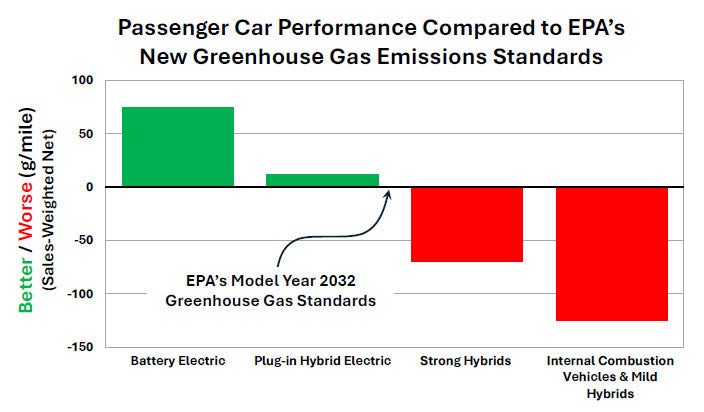Harris Promises Not to Make You Buy an EV—Until After She Wins
Michael Buschbacher /
Vice President Kamala Harris’ claim that she “will never tell you what kind of car you have to drive” is the climate-policy equivalent of President Barack Obama’s famous lie about the Affordable Care Act: “If you like your health care plan, you can keep it.”
But while Obama at least managed to get a law passed, the Biden-Harris administration has tried to transform the automotive industry without even persuading Congress.
To be sure, while serving in the U.S. Senate in 2019, Harris enthusiastically co-sponsored legislation mandating that all new car sales be electric by 2040. But as vice president, she has given up on lawmaking and opted instead to pursue a “whole of government” effort that relies on a series of interlocking agency rulemakings.
The Environmental Protection Agency and Harris’ home state of California are at the heart of this effort. For its part, the EPA’s new nationwide vehicle rules reverse-engineer an electric vehicle mandate by setting standards so stringent that no conventional vehicles—even hybrids—can meet them.

As those standards ramp up, the only way automakers can comply is to make and sell more plug-in battery vehicles or to buy regulatory “credits” from competitors that do. EPA projects automakers will need to make 68% of their new vehicles battery models by model year 2032—roughly seven years from now.
That, of course, means that automakers must also rapidly phase out the production of gas-powered cars and trucks.
At the same time, climate bureaucrats in California are not only banning conventional vehicles within the decade, but have also imposed new purchase mandates. The so-called Advanced Clean Fleet rules require truck drivers to replace their diesel trucks with vastly inferior (and much more expensive) electric models starting in January. And the Biden-Harris EPA is poised to give its blessing to California’s electrification programs—just as soon as the election is over.
The costs of these electric vehicle mandates fall on ordinary consumers, even those who don’t buy electric vehicles. Automakers lose tens of thousands of dollars per electric vehicle they sell, and they have to offset those losses by jacking up the price of conventional vehicles—a phenomenon economists call a “regulatory cross-subsidy,” or “the government’s hidden pocketbook.”
The push to electrify trucking is even more unhinged. Electric trucks are very expensive to buy and have terrible payload capacity and range. That’s why the much vaunted Tesla Semi is used for little more than hauling Cheetos bags, which are apparently more than half filled with air.
Almost everything anyone buys gets shipped on a truck at some point, and the shipping industry will have no choice but to pass these enormous costs downstream. Look forward to tighter supply chains and higher prices for everything from auto parts to household items to medical supplies and other critical items that rely heavily on truck transportation.
If you thought grocery prices were bad now, just wait.
This will hit working-class Americans twice over, increasing costs on those already struggling to make ends meet while simultaneously lowering the demand for American labor. Electric vehicles require about 40% less labor than traditional cars, not because of productivity gains, but because the batteries are manufactured elsewhere—typically by entities controlled by China, which dominates the battery supply chain end to end.
What does the vice president hope to get from sacrificing our national security and the interests of poor Americans in this way? According to her bean counters at the EPA, not much. State electric vehicle mandates will lead “to little to no change” in greenhouse-gas “emissions at a national level,” and will thus “result in an indistinguishable?change in global temperatures.”
EPA’s federal standards similarly will have at most a rounding-error’s worth of climate benefits.
As Americans are starting to realize, the Biden-Harris electric vehicle mandates are all pain and no gain. No wonder she’s trying to gaslight us as Election Day approaches. Indeed, Harris made her disingenuous claim that she “will never tell you what kind of car you have to drive” in the swing state of Michigan.
But while Harris’ desire to run from her record is understandable, it’s just not credible. “There is not a thing that comes to mind,” Harris said just a few days later on TV’s “The View” when asked if there was anything she would have handled differently from President Joe Biden.
Whether “the future is electric”—and thus at odds with American consumers and workers—depends therefore in no small part on what happens in the next two weeks.
We publish a variety of perspectives. Nothing written here is to be construed as representing the views of The Daily Signal.
